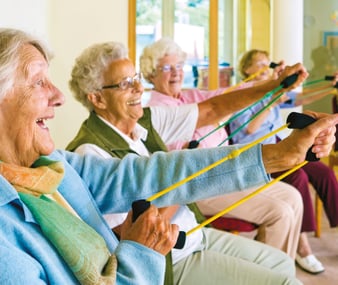Why activities for people with dementia are so important
For people with dementia, participating in engaging activities and staying active is vital for both physical and cognitive health. When a loved one is diagnosed with dementia, it can be a very difficult time for their family, friends and caregivers, and experiencing more long-term concerns about diminishing cognitive function alongside their wellbeing are natural.
It’s common for people with dementia to struggle with issues like depression, isolation, lethargy and loneliness, and despite the best efforts of those important to them as well as care staff in a residential home setting, it’s not always easy to manage the emotional, physical and behavioural situations that can arise because of dementia. (Read more here for information on dementia training for care staff).
But there are many ways in which someone with dementia can not only still experience a rich, happy and fulfilling life, but also maintain a connection to the things they have always enjoyed doing and most importantly, a connection to who they are as a person. Engaging in activities that are tailored to a person’s unique needs and experiences can also help to bring them closer together with care staff, who want nothing more than to provide the best possible, person-centred care to those they care for.
It might be difficult to know where to begin when deciding on the best activities for people with dementia, but we have compiled a list of what we think are the top 10 activity ideas to help people with dementia enjoy the best possible quality of life.
Read more here if you're looking to adjust your ideas for activities for late-stage dementia, or activities for people with learning disabilities affected by dementia
-
Cooking
-1.png?width=314&height=257&name=MicrosoftTeams-image%20(2)-1.png)
One of the key considerations for thinking about the best activities for people with dementia is stimulation of the senses, and there are very few things that can stimulate all five senses like cooking.
In a care home setting, cooking is an ideal activity that can help to boost communication, engagement with others, a sense of purpose, dexterity and memory retention, as well as having a tasty treat at the end!
-
Scrapbooks or memory boxes
Despite the fact that for people in the earlier stages of dementia, it might be increasingly difficult to recall names or recent activities like what they had for dinner last night, it’s very often the case that more long-term memories, like those from childhood or a special occasion like their wedding day, can still be very clear and easy to recall in detail.
By giving people with dementia the opportunity to do something like create and look through a scrapbook of photos, it can not only rekindle fond memories, which helps with retention and to reduce anxiety or depression, but it can also spark meaningful conversations and connections with care staff as they recount the story behind a particular photo.
They can also create a memory box of their happiest memories which can include things like photographs of families or pets, special mementos from their life or things that remind them of their favourite hobbies or interests. This could help the person keep a stronger connection to who they are and what they have experienced in their life.
-
Indoor and outdoor exercise
Engaging in exercises, whether in a group or individual setting, can have significant benefits to people with dementia because it helps to maintain and improve mobility and balance, a sense of physical wellbeing and overall health. 
Especially in a group setting, engaging in programs such as chair yoga, mobility exercises or gentle resistance training or others can greatly work to promote a sense of community and social interaction, as well as reduce feelings of isolation and agitation.
Outdoor exercise activities like walking in the garden or in nature can be very beneficial too not just to overall health because of the sunlight and fresh air but also wellbeing and as a means of connecting with the senses. It may also help to rekindle fond memories of time spent in nature.
Engaging in exercises, whether in a group or individual setting, can have significant benefits to people with dementia because it helps to maintain and improve mobility and balance, a sense of physical wellbeing and overall health.
Especially in a group setting, engaging in programs such as chair yoga, mobility exercises or gentle resistance training or others can greatly work to promote a sense of community and social interaction, as well as reduce feelings of isolation and agitation.
Outdoor exercise activities like walking in the garden or in nature can be very beneficial too not just to overall health because of the sunlight and fresh air but also wellbeing and as a means of connecting with the senses. It may also help to rekindle fond memories of time spent in nature.
-
Painting or drawing
Though there is no cure for dementia, one of the biggest goals for those caring for dementia is slowing down and minimising the process of cognitive decline as much as possible. As someone goes through the stages of dementia, one of the areas of decline that can most impact their mental wellbeing is not being able to communicate as well as they once could, which can leave them feeling frustrated, depressed and isolated.
Through painting or drawing, people with dementia have an opportunity to express their creativity and express what they feel in ways that aren’t just about verbal communication. It can provide significant brain stimulation as well as hand-eye coordination, not to mention a sense of achievement. A group painting or drawing experience can also help to foster a sense of community with other residents and care staff too.
-
Dancing
Like exercise, dancing classes that are specifically tailored to older people with dementia is a great way for them to keep fit and healthy, engage in a communal activity and engage with their senses. Music has also been found through multiple studies to have a calming and soothing effect. It can also help to rekindle fond memories of days in their past spent dancing.
-
Karaoke and sing-alongs
Singing along to music or even just listening to music can help people with dementia to develop and maintain relationships with the people around them, such as other residents or care staff, because it gets them involved in a collaborative and shared experience, promoting self-expression and a greater sense of wellbeing.
Because many studies show that music has a strong connection to the memory area of a person’s brain, singing along or engaging with music generally can also act as a prompt for reminiscing about past experiences, such as their favourite songs from their youth or a song they might have sung to their children.
-
Puzzles
Puzzles are one of the most significant tools to be used when providing person-centred wellbeing activities for people with dementia because among other benefits, they allow the person to use both the logic and problem-solving part of their brain and the creative part of their brain simultaneously. .png?width=344&height=229&name=MicrosoftTeams-image%20(3).png)
Another significant factor is the way in which engaging in puzzles might help to slow down cognitive decline. This can be possible because of the fact that the brain, essentially, is getting a workout from the activity. Whether someone with dementia does a puzzle on their own or whether they do it as part of a wider group, there are benefits to both.
By having to concentrate on all the pieces, trying to decide what goes where, doesn’t just provide an opportunity for visual stimulation, but a person with dementia also has something to focus their mind on, to concentrate their mental energies on, which can alleviate the feelings of anxiety and agitation that often come as a result of dementia.
And in a group, the activity can help someone with dementia to keep their social skills sharp by collaborating and discussions the puzzle and how to solve it with others. And at the end of all that, there is a great sense of accomplishment to be had when the puzzle is complete.
-
Quizzes
Whether it’s a quiz they have helped to devise themselves or if it’s a quiz that has been sourced or developed by care staff, getting involved in quizzes can also be very beneficial to people with dementia because it either allows them to get involved in a communal activity by discussing the question and potential answer if the game is played in groups, or it can test their memory retention abilities if they are playing individually.
It can also be tailored to the interests and personal histories of the residents; for example, if some of the residents are interested in animals, space, or the Second World War.
-
Arts and crafts
Because a significant aspect of providing person-centred wellbeing activities for people with dementia is about stimulating the senses, and if possible combining that with something to stimulate their cognitive abilities, getting involved in arts and crafts is an ideal activity.
It can be a fun and creative way to stimulate the brain and help to potentially rekindle memories of times spent in the past making items for loved ones, for example, or stories about their loved ones. It can promote good community engagement as residents discuss what they’re making with each other, and it can help to build bonds with care staff who can either help in the process of making something or ask insightful questions about the process or what the item is.
It is another perfect way for someone with dementia to find an avenue not just to challenge themselves and retain as much mental sharpness as possible, but to express their creativity in non-verbal ways, leaving them with a sense of accomplishment and even a closer connection to their families if they are making something for a loved one.
-
The Oomph! On-Demand Platform
Above are some of our top ideas when thinking about activities for people with dementia, but you might find yourself thinking that it would be difficult to try and organise so many different activities, or it might be a challenge to constantly think of new ways to explore these activities.
might find yourself thinking that it would be difficult to try and organise so many different activities, or it might be a challenge to constantly think of new ways to explore these activities.
The Oomph! Wellbeing and Activities Platform ensures that the hard work of devising and developing activity programmes is done for you. With more than 1,000 activity ideas to choose from, the Oomph! Wellbeing and Activities Platform can help to tailor activity programmes to the residents in a specific care home, and have helpful filters such as ‘dementia friendly’ as well as guidance and alternative suggestions to help you provide the best and most engaging activities possible.
Click here for more information on the Oomph! Wellbeing and Activities Platform




.png)

.jpg)
.webp?width=80&height=80&name=HTD%20Awards%202023%20Badge%20(4).webp)














